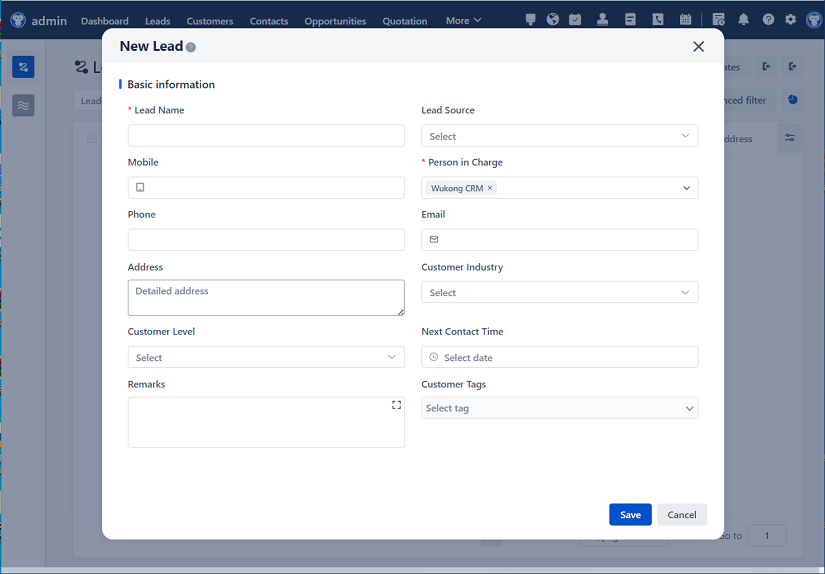
△Click on the top right corner to try Wukong CRM for free
You know, I’ve been thinking a lot lately about how customer service has changed over the years. It used to be that if you had a problem with a product or service, you’d have to call a company, wait on hold for ages, and then maybe—if you were lucky—get to speak with someone who could actually help. It was frustrating, time-consuming, and honestly, kind of outdated. But now? Things are different. I mean, just look at how much we rely on our smartphones and messaging apps. We chat with friends, order food, book rides, and even manage our bank accounts—all through apps like WeChat. So why shouldn’t customer service be just as seamless?

That’s exactly why I find the idea of an Intelligent Customer Service CRM System based on WeChat so exciting. It’s not just another tech buzzword; it’s a real solution to a real problem. Think about it: WeChat has over a billion active users in China alone. It’s not just a messaging app anymore—it’s a lifestyle platform. People use it for everything. So, integrating customer service directly into WeChat makes perfect sense. No more switching between apps, no more endless phone calls. Just open WeChat, message the company, and get help instantly.
But here’s the thing—it’s not just about being convenient. What makes this system truly “intelligent” is how it combines automation with personalization. You see, when you message a company through WeChat, you’re not just talking to a bot that gives you canned responses. The system uses AI to understand your query, pulls up your customer history, and can even predict what you might need before you ask. It’s like having a personal assistant who already knows your preferences, past purchases, and common issues.
Let me give you an example. Imagine you bought a smart speaker from a tech company last month. A few days ago, it stopped working. Instead of digging through your email for the order number or calling customer support during business hours, you just open WeChat, type “My speaker isn’t working,” and boom—the system recognizes your account, checks your purchase history, and instantly knows which model you have. It might even suggest a troubleshooting step based on common issues with that model. If that doesn’t work, it can seamlessly transfer you to a live agent—without making you repeat all your info.
And that’s where the CRM part comes in. The Customer Relationship Management system is the backbone of this whole setup. Every interaction you have—whether it’s a quick chat with a bot or a long conversation with a human agent—gets logged and analyzed. That means the next time you reach out, the system remembers everything. No more “Can I have your order number?” or “Let me pull up your account.” It’s all right there. It’s like the company actually remembers you as a person, not just another ticket number.
Now, I know what some of you might be thinking: “Isn’t this just another chatbot?” And sure, on the surface, it might seem that way. But the difference is depth. A regular chatbot follows scripts. It can answer basic questions but falls apart when things get complicated. This intelligent CRM system, though? It learns. It adapts. It uses natural language processing to understand not just what you’re saying, but what you mean. It can detect frustration in your tone and escalate the issue faster. It can recommend products based on your browsing history. It can even send you proactive updates—like “Your package has been delayed, but here’s a discount for the inconvenience.”
And let’s talk about businesses for a second. From their perspective, this system is a game-changer. First, it reduces response time dramatically. Customers don’t want to wait. They want answers now. With AI handling routine inquiries—like order status, return policies, or product specs—human agents can focus on more complex issues. That means better service quality and lower operational costs. Plus, the data collected from every interaction helps companies spot trends. Maybe a lot of customers are having the same problem with a new product? That’s valuable feedback that can lead to improvements.

Another thing I love is how this system supports omnichannel communication. Sure, WeChat is the main platform, but the CRM can sync with email, phone, and even in-store systems. So if you start a conversation on WeChat and then call the support line later, the agent can pick up right where the chat left off. No repetition. No frustration. Just smooth, continuous service.

And let’s not forget about personalization. Have you ever noticed how some companies just “get” you? They recommend products you actually like, they remember your birthday, they send you offers that feel relevant? That’s not magic—it’s data. This CRM system uses machine learning to analyze customer behavior and preferences. So if you always buy eco-friendly products, it’ll highlight those in recommendations. If you tend to shop during sales, it’ll notify you when discounts are coming. It’s not just selling; it’s building a relationship.
Of course, none of this works without trust. People are rightly concerned about privacy. I mean, we’re talking about a system that collects a lot of personal data—purchase history, messages, preferences. So security has to be a top priority. The good news is that WeChat and modern CRM platforms take data protection seriously. They use encryption, comply with regulations like GDPR and China’s PIPL, and give users control over what data is shared. Transparency is key. Customers should know what’s being collected and how it’s used.
Another concern I’ve heard is that AI might replace human jobs. And yeah, automation does change the workforce. But in this case, it’s more about augmentation than replacement. The bots handle the repetitive, time-consuming tasks, freeing up human agents to do what they do best—empathize, problem-solve, and build trust. In fact, many companies report higher job satisfaction among support teams after implementing intelligent CRM systems because they’re no longer stuck answering the same questions over and over.
Let’s also talk about scalability. Small businesses might worry that a system like this is too complex or expensive. But cloud-based CRM solutions are making it more accessible than ever. You don’t need a huge IT team or expensive servers. Many platforms offer pay-as-you-go models, so even startups can afford advanced customer service tools. And the return on investment? Huge. Happy customers spend more, refer friends, and stay loyal longer.
I should mention that this isn’t just theoretical. Companies across China—and increasingly, around the world—are already using WeChat-based CRM systems with great success. Retailers, banks, telecom providers, even government services are adopting them. The results? Faster response times, higher customer satisfaction, and better sales conversion rates. It’s not a trend; it’s the new standard.
And here’s something else—this system isn’t just for external customers. It can also improve internal communication. For example, if a customer asks about a delivery delay, the CRM can automatically check inventory and logistics data, then notify the relevant department. It creates a feedback loop that helps the whole organization work better.
Looking ahead, I think we’ll see even more integration. Imagine combining this CRM with voice assistants, AR product demos, or even blockchain for secure transactions. The possibilities are endless. But the core idea will always be the same: making customer service faster, smarter, and more human.
Honestly, I believe this kind of system represents the future of customer experience. It’s not about replacing people with machines. It’s about using technology to remove friction, save time, and create meaningful interactions. It’s about treating customers like individuals, not just data points. And in a world where attention is scarce and loyalty is hard to earn, that makes all the difference.
So, if you’re a business owner, ask yourself: Are you meeting your customers where they already are? If you’re a consumer, think about how much smoother your life could be with instant, intelligent support at your fingertips. And if you’re just curious about tech, well—this is one innovation that’s not just cool, but truly useful.
FAQs (Frequently Asked Questions):
Q: Is this system only available in China?
A: Well, WeChat is most popular in China, but similar models are being adopted globally. Platforms like WhatsApp, Facebook Messenger, and Line are being used for intelligent CRM in other regions. The concept works anywhere messaging apps are widely used.
Q: Can the AI really understand complex customer issues?
A: Honestly, it depends on how it’s built. Basic bots struggle, but advanced AI with natural language understanding and machine learning can handle surprisingly complex conversations—especially when it has access to customer history and product databases.
Q: What happens if the AI can’t solve my problem?
Good question. If the system hits a limit, it automatically escalates to a human agent—along with all the context from your chat. So you don’t have to start over. It’s like the AI does the legwork, and the human finishes the job.
Q: Do I have to give up my privacy to use this?
Not at all. Reputable systems let you control your data. You can opt out of certain features, delete your history, or limit what’s shared. The key is transparency—companies should clearly explain what they collect and why.
Q: How do businesses benefit from this besides faster responses?
Oh, there are tons of benefits. They get better customer insights, reduce support costs, increase sales through personalized recommendations, and improve customer retention. It’s not just service—it’s strategy.
Q: Can small businesses afford this kind of system?
Absolutely. Many cloud-based CRM platforms offer affordable plans tailored for small teams. Some even have free tiers. The investment usually pays off quickly through improved efficiency and customer satisfaction.
Q: Is WeChat safe for handling customer data?
WeChat has security measures in place, but businesses should still follow best practices—like encrypting sensitive info and complying with data protection laws. Using a trusted CRM integrated with WeChat adds an extra layer of safety.
Q: Will human customer service agents become obsolete?
Not a chance. AI handles routine tasks, but humans are still essential for empathy, complex problem-solving, and building trust. Think of it as teamwork—machines and people working together to deliver better service.
Related links:
Free trial of CRM
Understand CRM software
AI CRM Systems

△Click on the top right corner to try Wukong CRM for free